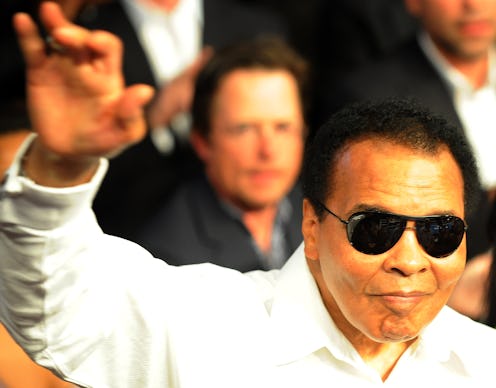Late Friday night, Muhammad Ali died at the age of 74 after being admitted to the hospital for respiratory issues on June 2. His loss is a devastating blow, of course, and the greatest boxer the world has ever known leaves behind an unparalleled legacy. In a 1974 interview with David Frost, Ali revealed how he wanted to be remembered, and his words are as much about his life spent fighting for equality and justice as they are about the heroic feats he accomplished inside the boxing ring. In true Ali fashion, his words flowed like poetry, spinning a recipe for a life well-lived.
When Frost asked Ali how he would like to be remembered, Ali responded:
I'd like for them to say: He took a few cups of love. He took one tablespoon of patience, one teaspoon of generosity, one pint of kindness. He took one quart of laughter, one pinch of concern. And then, he mixed willingness with happiness. He added lots of faith, and he stirred it up well. Then he spread it over a span of a lifetime, and he served it to each and every deserving person he met.
Ali did just that. He spent a lifetime fighting for what believed in and refusing to fight for the things he didn't. He was a civil rights activist and a humanitarian, who refused to be drafted into the Vietnam War on the grounds of his religion and that he had no quarrel with the people of Vietnam. In his later life, as he battled Parkinson's disease, Ali continued to travel around the world spreading messages of peace and perseverance.
The Frost interview occurred before the famed "Rumble in the Jungle" fight between Ali and George Foreman and after Ali's boxing license was reinstated in light of his refusal to be drafted. Given the context, it only makes his words all the more powerful. Ali spent a lifetime fighting the injustices black men and women faced, and he did so not only with his words, but also with his actions. Inside the ring, he truly was the greatest; outside of it, he was a controversial hero who truly stood up for his beliefs. At the height of his power, many feared Ali, but even then, his words revealed a man with a fire to change the world for the better.
To know that in 1974, Ali already knew how he wanted to be remembered speaks volumes about who he was as a man. Before he stepped into the ring with Foreman, he revealed the recipe for a life full of meaning, one in which he would be remembered as a person who changed other people's lives for the better. He wanted to be remembered for kindness, patience, and faith.
He wanted to be remembered as the hero he was, a man who, in his own way, changed the world.
